The longevity of your guitar ultimately depends on how you treat it. Proper cleaning and conditioning will lengthen the lifespan of your guitar. It is very critical that you should be taking care of your guitar, especially if you have invested a lot of money and time for it. Years of neglect will render the guitar unplayable. However, the normal wear and tear of the guitar should not dissuade you from avoiding cleaning your instrument. Maintenance of the instrument is still key to avert deterioration and preserve the integrity of the guitar.
However, it is not difficult to clean your guitar. All it takes is time and effort. That is not a lot if you want to keep your guitar for a long time. Furthermore, it will save you money in the long run as you prevent buying another guitar in the future.
What Are The Causes of A Damaged Guitar?
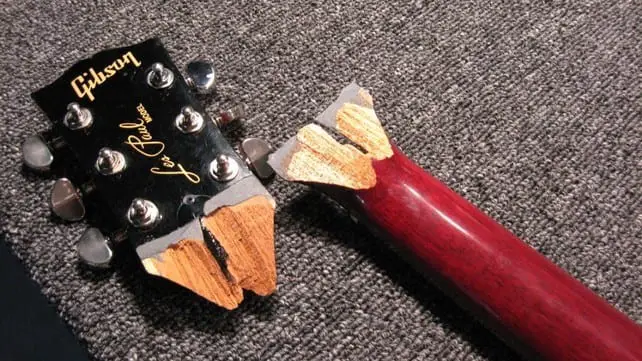
There are a lot of factors that would damage a guitar. Physical damage is one of the most common reasons why you end up having a damaged guitar. However, if you are careful with your guitar, you can use it for many years to come.
Apart from the physical trauma that renders a guitar damaged, there are a lot of factors that cause a guitar to be unplayable. One of the major factors is dirt. If you are someone who goes out on gigs for most of the time, you will know that dirt can creep up on different parts of your guitar.
Dirt and other gunk like sweat and dead skin cells can build up, and they begin to cause the deterioration of your guitar. Sweat and oil can wear down the lacquer and will cause damage to the guitar, especially the fretboard, which is one of the most exposed areas of the guitar.
A clean fretboard not only feels good for your fingertips, but it does make the guitar sound better. Aside from the sweat, dirt, and dead skin cells, moisture, and acids can also cause the deterioration of the wood material. When the moisture dries up, it slowly rots the wood and results in the frets loosening. You will have to send your guitar for repair if that happens.
Moisture is also harmful to the other parts of the guitar, aside from the fretboard. Parts such as the potentiometers and the switches slowly become eroded due to the acids found in sweat. Alcohol and certain oils also facilitate the deterioration of the guitar through the same process.
Most older guitars are made up of air-dried wood, while newer guitars are more prone to humidity. This makes newer guitars very vulnerable to humidity and its effects. Make sure that you know what your guitar is made of so you can control the humidity of the area where you play. This will increase the lifespan of your guitar.
Notice that the main culprits are sweat, acid, and moisture, and all of this can be prevented with just one step – washing your hands. By washing your hands before using your guitar, you immediately remove dirt and sweat from your hands, so it does not cross to your guitar. Drying your hands beforehand will keep moisture away from the guitar. Now, all you need to do is to find a good place that does not have a lot of humidity for you to store your guitar and avoid its fast deterioration.
Washing your hands is very simple to do, yet it saves you time and money, so you don’t have to buy new strings or spend a lot of time changing them. In the grand scheme of things, the only step to prevent any type of damage that would deteriorate your guitar would be to wash your hands. You avoid scrubbing your fretboard frequently by simply washing your hands before playing your guitar.
Another tip to preventing dirt from accumulating on your guitar is to put it back in its case. It is another step that is very simple that does not take a lot of effort on your part. By simply putting it back in its case, you prevent the dust from getting into your guitar. This is often an overlooked and understated tip that most guitar users tend to forget. Most of us would like to show our guitar by placing it outside of its case for exhibition, but this would just expose the instrument to numerous factors such as dirt and humidity.
How To Clean Your Guitar
While prevention is still better than having your guitar repaired, there will come a time that you will have to clean your guitar. You will inevitably need to clean your guitar. Some would avoid doing so since it would take a lot of time. So, when is the best time to clean your guitar? If you can visibly see grime and dirt coming out from different parts of the guitar or rusts from the coil and other hardware, then it is time to clean it. For those who are careful with their guitar, the best time to clean the instrument is when you change the strings. This is the right time to do so since removing and changing strings usually takes a lot of time, so it is much better to clean your guitar at the same time.
Cleaning Your Fretboard
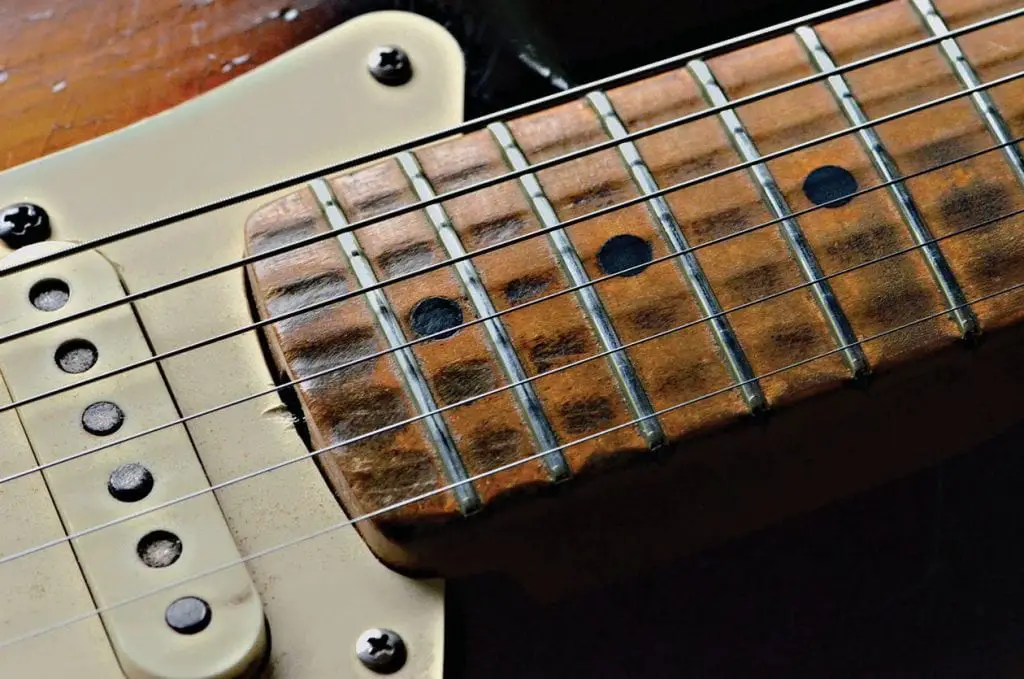
As you already know, there are different types of fretboard materials. Each has its corresponding ways on how to clean them. When it comes to Rosewood and Ebony fretboard, you can use steel wool to clean out the gunk from the fretboard. A 0000 steel wool would do wonders for your fretboard. The fine steel fibers will remove all the dirt from the frets without damaging them.
Rub the steel wool in a circular fashion to effectively remove the dirt that has accumulated. Once done, remove the debris, and you can start polishing your fretboard using certain products. Make sure to apply an ample amount When applying conditioner products to your fretboard. Avoid overdoing it as it may cause issues later on.
For Maple fretboards, make sure to use the ultra-fine 0000 steel wool. The reason behind this is that Maple fretboards are very fragile and have a lighter tone. You can also use a damp cloth to clean out the fretboard only if you do not have the ultra-fine steel wool.
Maple fretboards that have been lacquered should only be cleaned using a damp cloth. The steel wool will only leave a matte finish on the surface. After cleaning, use a vacuum to remove the fibers from the steel wool. This will help remove the fibers from the finish.
Another method is to use a small brush or a toothbrush and a fretboard conditioner. The fine strands of the toothbrush can scrub all the dirt away without harming the surface of the wood or the frets. Spray the fretboard conditioner lightly and work your way around the frets using the toothbrush.
Cleaning The Guitar Body
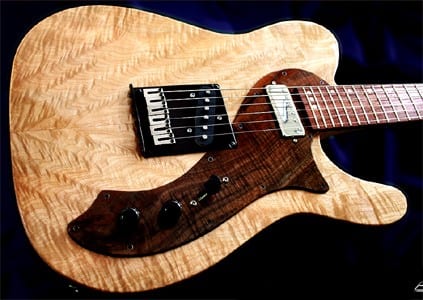
No matter how careful you are with protecting your guitar from dirt and grime, there will always come a time that you will have to clean it. Fortunately, the guitar body is one of the easiest parts to clean. The only factor that you need to consider before cleaning the body of the guitar is its finish. Certain finishes need to considered first as it will make or break your guitar.
The best way to clean a guitar body with a gloss finish is with a simple cloth. A damp cloth should remove all the dirt and grime. Since the gloss finish has a protective layer, the moisture from the damp cloth won’t reach the deeper layer of the guitar. Once done, you can simply add a guitar polish to fully clean the guitar. Make sure to spray the polish onto the damp cloth and use it to wipe the guitar instead of directly spraying it over the surface of the guitar.
Add wax to have a protective layer from grime and dirt. The wax finish will help keep your guitar stay clean for a longer time. Avoid using household cleaning products on your guitar as these products are very harsh on the surface of the guitar. Choose the right product for the right finish on your guitar, and you will never have to worry about damaging it.
Matte-finished and satin-finished guitars are rare nowadays, but if you do own one, you would know that the areas where your hands often touch become shiny. A dry cloth should remove any dirt and grime from the surface. Refrain from using polish, wax, or any household cleaning solution as it will only add more problems. A dry cloth should suffice. If you need to thoroughly clean your guitar, you can use a slightly damp cloth to clean the surface, however, use it only when it is very necessary for you to clean the area.
Cleaning The Hardware
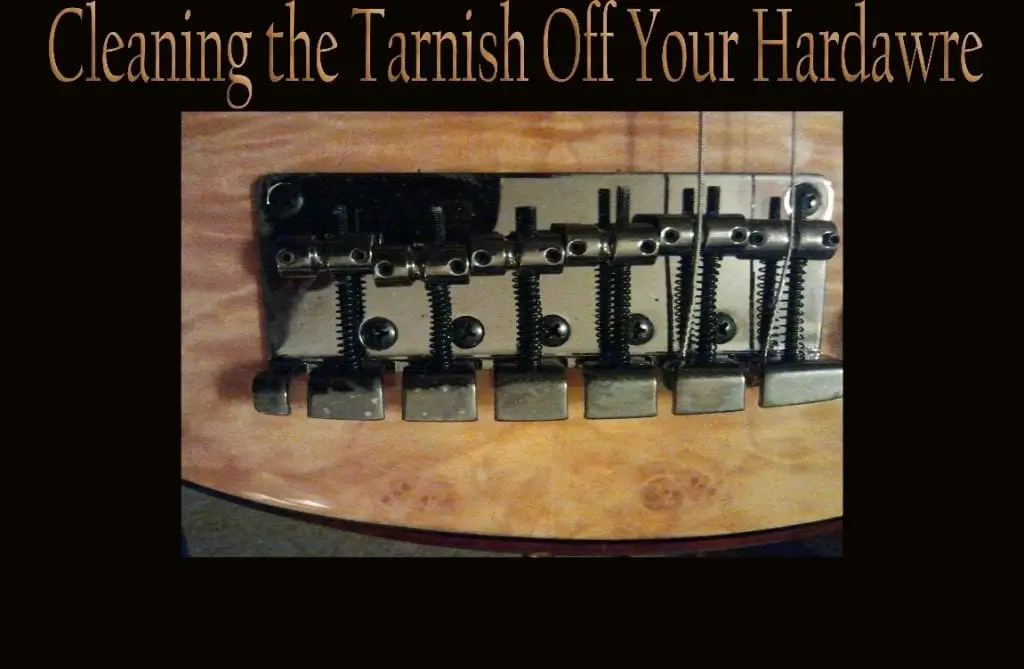
Cleaning the hardware on your guitar is tricky. Some parts are highly sensitive to a certain solution. Metals are vulnerable to moisture as such corrosion is your enemy. Sweat and sebum can also affect the integrity of the hardware.
You can use a soft cloth and spray a small amount of guitar polish. The polish will help loosen up the dirt and, with brisk and soft movement, wipe the grime from the area. Remember to avoid leaving any residue of the polish on the surface of the guitar. If the hardware is already covered in rust, it is best to remove it from the guitar and do a bit of scrubbing using a toothbrush. Once you are done with cleaning the hardware, dry the items using a paper towel.
For hard to reach areas, you can always use cotton buds. Cotton buds are great at removing sticky grime from crevices. They are also good at removing dust. You can also use cotton swabs to clean the saddle slot.
Products To Use To Clean A Guitar
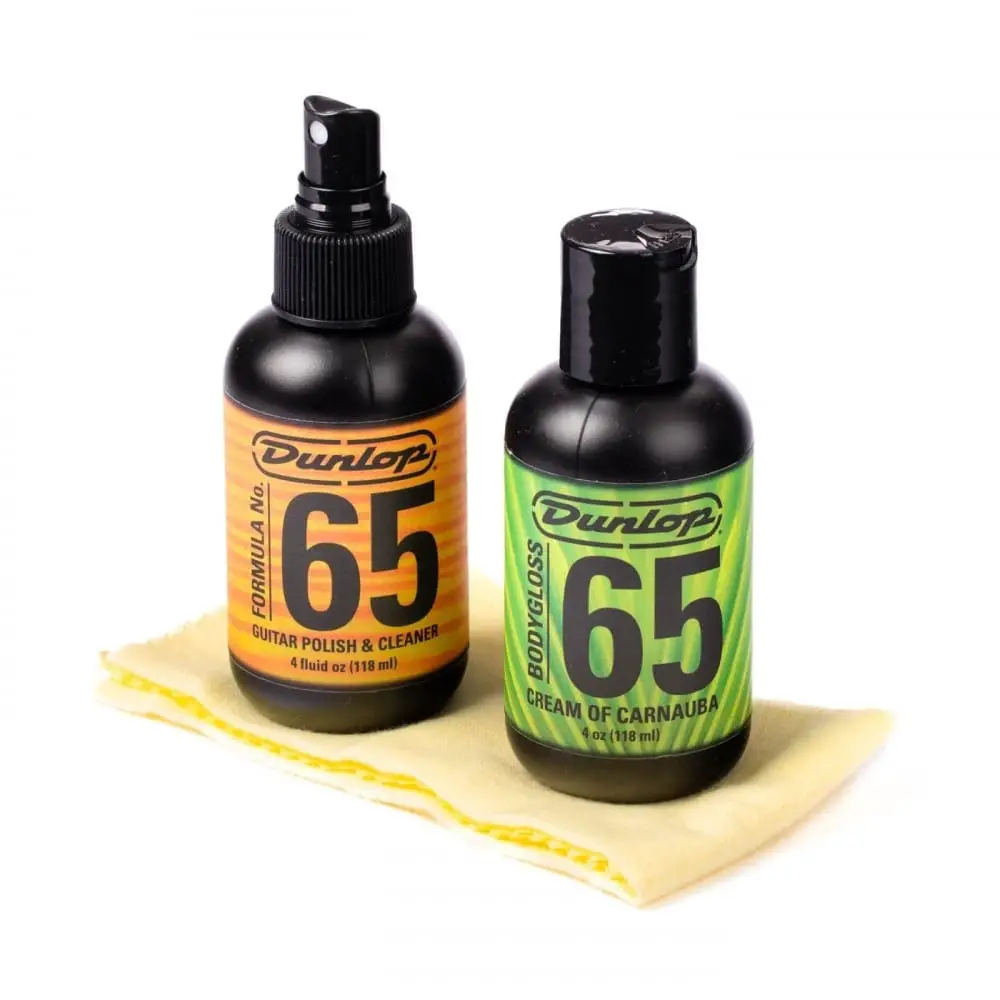
It will not matter whether you have a specific kind of finish on your guitar. Cleaning your instrument should always be done regularly. There are hundreds of products on the market that are good for cleaning an instrument; however, there are only a few that you would need without spending too much.
Microfiber cloths are an essential tool to clean your guitar. Microfiber cloths absorb moisture and dust. When picking the right one, make sure to avoid choosing microfiber cloths that are used for during or polishing furniture as they are quite abrasive to the surface of the guitar. What makes microfiber cloth good at cleaning your instrument is that it holds moisture hence making it a good damp cloth to work with.
Cleaners and polishes are used if microfiber cloths or damp cloths barely remove any grime from the guitar. Most of these products can clear fingerprints, oil
residue, smudges, and dead skin cell buildup while providing your guitar with a shine. Before you purchase polishes, read the label first and see if it is compatible with your guitar finish. Carnuba wax is a great example of polish for your guitar.
When applying, avoid spraying it directly to the surface of the guitar. Always use the microfiber cloth and apply it on the cloth first. You can then start wiping the grime from the surface once the cloth is damp enough. You can also use the microfiber cloth to clean the strings. If you want a thorough cleaning, you can use a liquid string cleaner.
If you have excessive grime on your fretboard, steel wool would be another product to use that will effectively remove the layer of dirt.
Conclusion
A clean guitar will look, feel, and sound better. Taking care of the instrument should be as important as the music you produce. It is much better to keep your guitar clean than to keep on replacing different parts every few years, considering you still have a good instrument by that time. Maintaining the cleanliness of your guitar should also not be costly. These helpful products will keep dirt and grime at bay. By following these simple cleaning steps, your guitar should look and sound at its best.



